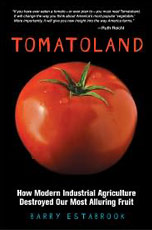The Consequences of Tasteless Tomatoes
 Former Gourmet magazine writer Barry Estabrook provides answers to anyone wondering why today’s supermarket tomatoes taste so bland in his new book Tomatoland: How Modern Industrial Agriculture Destroyed Our Most Alluring Fruit (Andrews McMeel Publishing, 240pgs). The author explores tomato farming in South Florida, where the majority of U.S. tomatoes are grown in the winter months. On the surface Florida’s sandy, nutrient poor soil seems an odd choice to grow the red fruit, but the state’s warm winter weather allows the plants to grow in the off season, and farmers compensate by saturating the earth with dozens of pesticides, herbicides and chemical fertilizers. Growers strive to create a uniformly shaped tomato that is hardy enough to survive transport across the country. The actual taste of the produce is no longer a factor, and even the color is not naturally achieved. Green tomatoes are gassed with ethylene to achieve their dull orange-red color.
Former Gourmet magazine writer Barry Estabrook provides answers to anyone wondering why today’s supermarket tomatoes taste so bland in his new book Tomatoland: How Modern Industrial Agriculture Destroyed Our Most Alluring Fruit (Andrews McMeel Publishing, 240pgs). The author explores tomato farming in South Florida, where the majority of U.S. tomatoes are grown in the winter months. On the surface Florida’s sandy, nutrient poor soil seems an odd choice to grow the red fruit, but the state’s warm winter weather allows the plants to grow in the off season, and farmers compensate by saturating the earth with dozens of pesticides, herbicides and chemical fertilizers. Growers strive to create a uniformly shaped tomato that is hardy enough to survive transport across the country. The actual taste of the produce is no longer a factor, and even the color is not naturally achieved. Green tomatoes are gassed with ethylene to achieve their dull orange-red color.
Even more tragic is the effect that all of the fertilizers and pesticides have on the migrant workers who pick the fruit. Many have suffered cancer, birth defects and other illnesses. The labor practices in South Florida are even more alarming. “Child labor and minimum wage laws are flouted,” writes Estabrook, quoted in a review for The New York Times. “The most minimal housing standards are not enforced.” He likens some of the work conditions to slavery.
“I began to see that the Florida tomato industry constitutes a parallel world unto itself, a place where many of the assumptions I had taken for granted about living in the United States are turned on their heads.”

